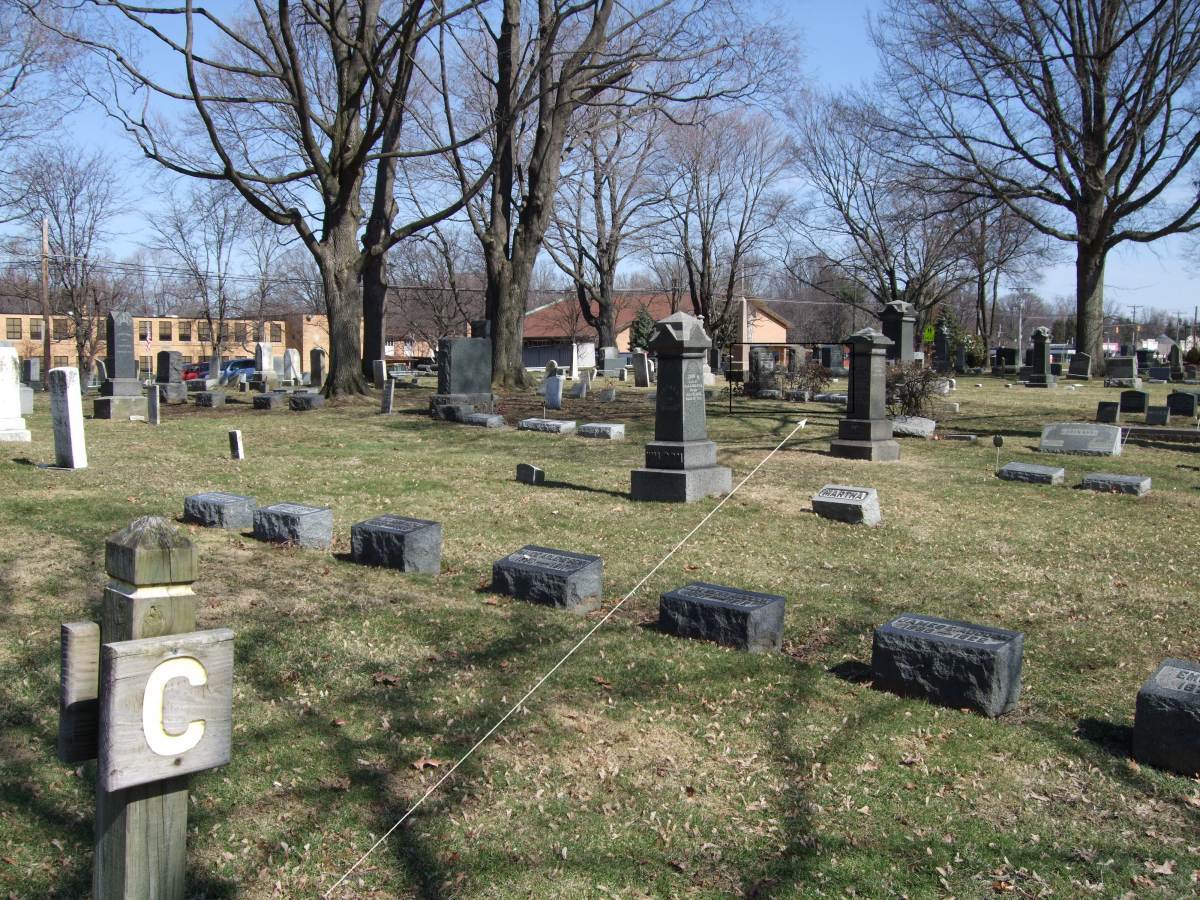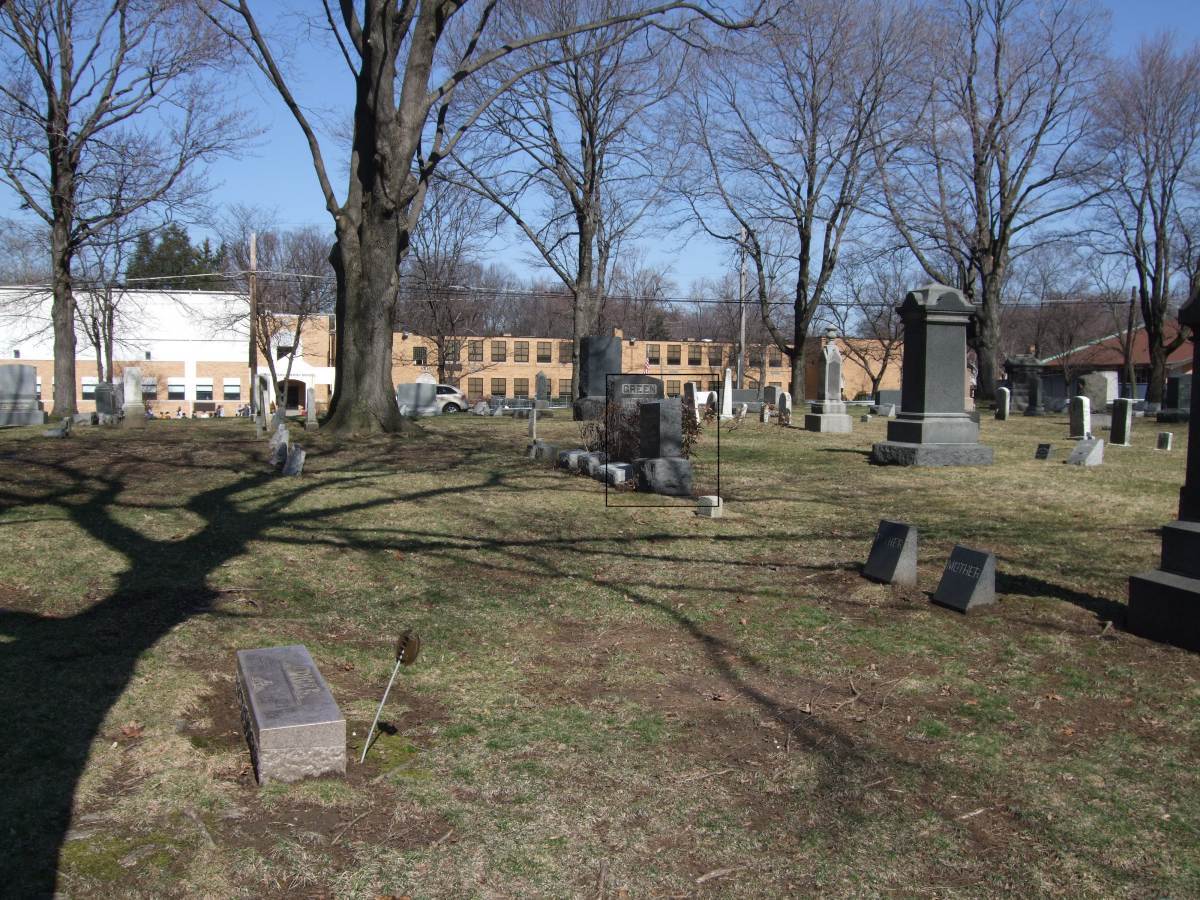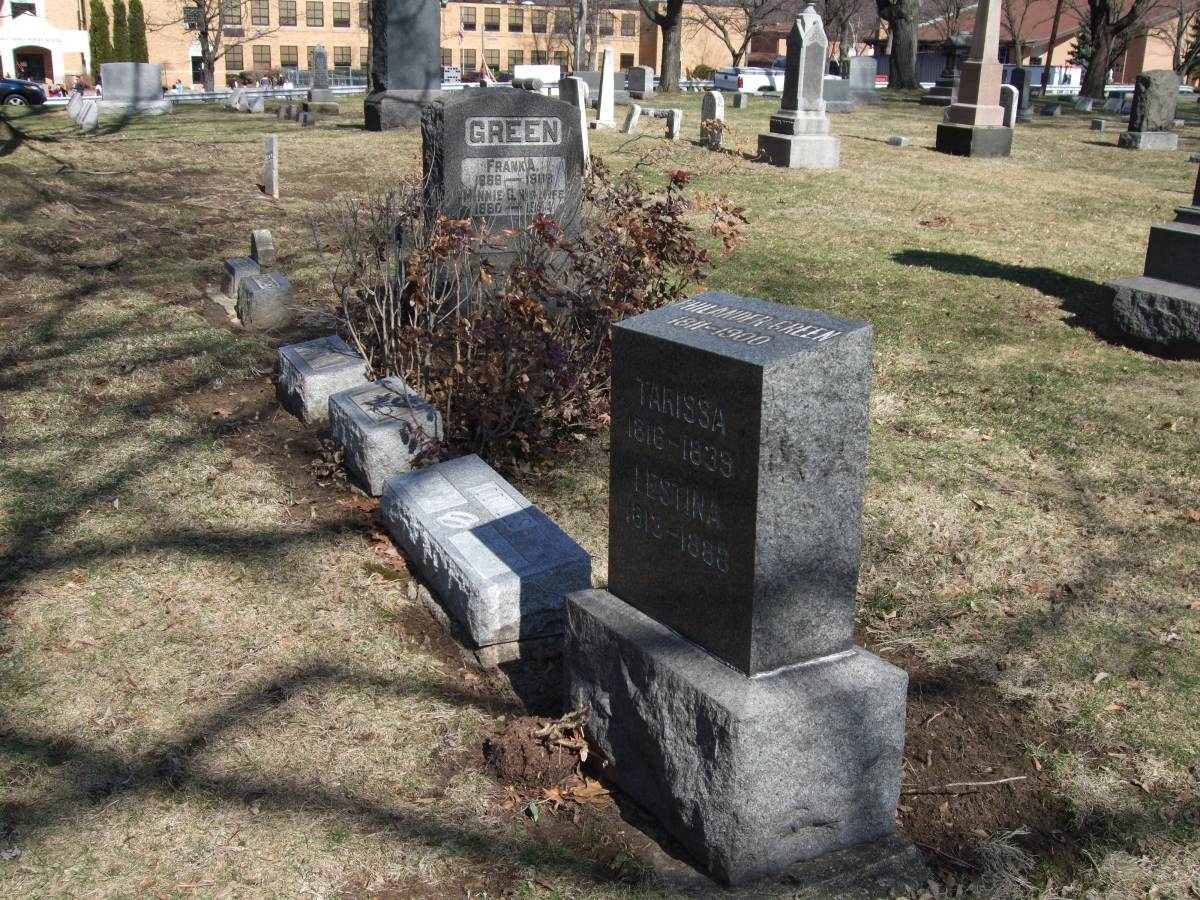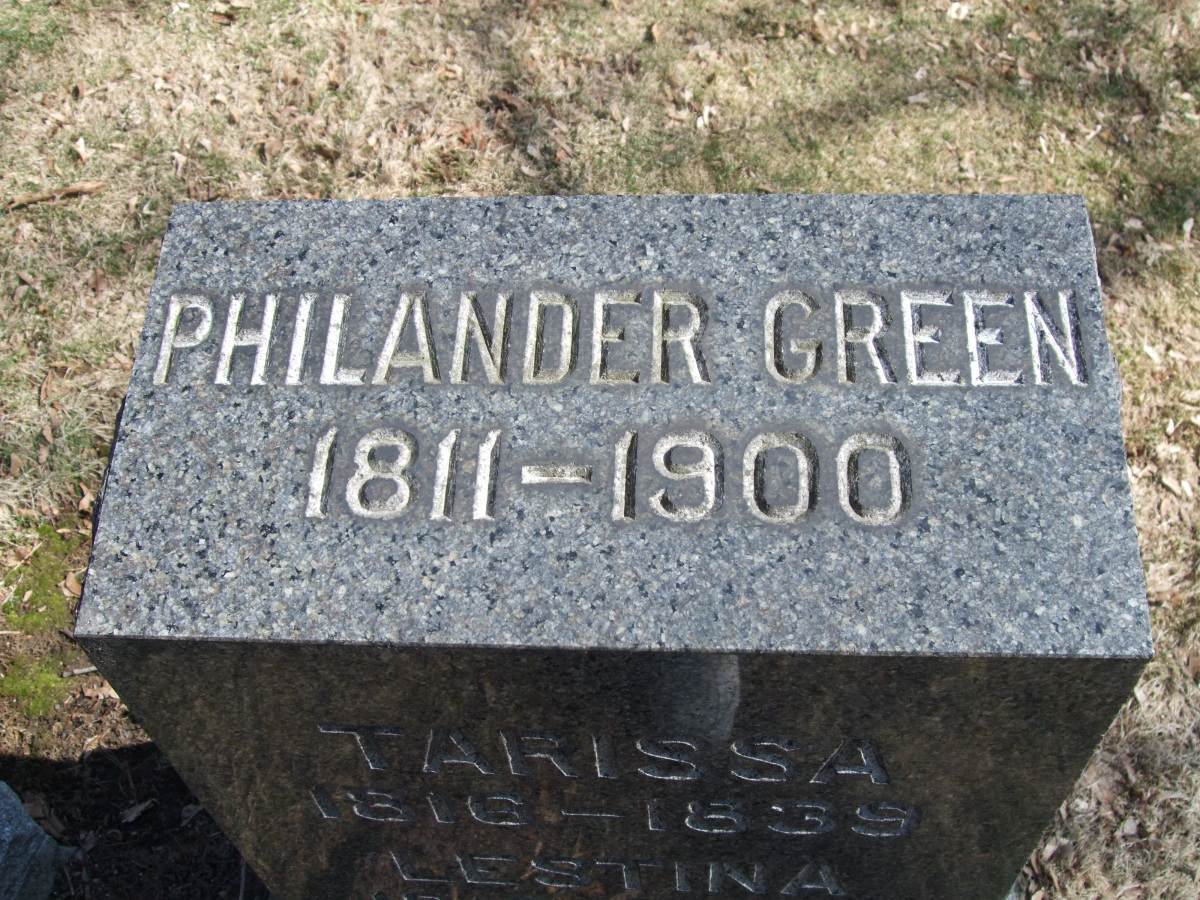Philander Green
1811-1900
![]()
Biographical Sketch Of Philander Green
Philander Green was born in Canfield, Mahoning County, Ohio, July 21, 1811. His immediate ancestry were natives of Connecticut, from which State his parents came into Ohio during the year 1810. His grandfather was a drummer in the Revolutionary War. He had four children, William and Susannah and Mary. Samuel, the younger of the two sons, was the father of the subject of this sketch. His mother's name was Lucy Bailey, whose ancestry was from Wales. When his father and mother came to Ohio in 1810 they put all their household goods on wagons, and started on their long and tedious journey of six hundred miles with horse teams. The roads were not well-ballasted railroads, with palace cars atop, but mud roads, rough and uneven. It was slow traveling, and took nearly six weeks to make the journey. The first winter spent in Ohio the family lived in an "old shed" which had been erected to shelter sheep, but which was cleaned up for the use of the pioneer family. His father was without a dollar, and in debt seventy-five dollars, for the expense of moving had been heavy. But Samuel Green was a tanner, a shoemaker, a blacksmith and a mason, and was very useful in the neighborhood, and soon paid his debts, besides gaining a living for himself and family. The family afterward lived near Akron, Ohio, for a short time, and then removed to Norton, in Summit County, where they resided until after the death of Samuel Green. The Norton home was planted in the woods. There were no hoards to be had for either the upper or under floor of their rude log house. In describing that" cabin in the wilderness," Philander says: "My father split logs and hewed them on one side for the under floor, and made clap-board shingles for the upper floor. For a bedstead he bored holes in one corner of the room, and cut poles the length and breadth he wanted. Two posts were' all he wanted. 'When these were put in their places, the next thing was to get a bed-cord. This he got by going into the woods with his ax and peeling the bark from an elm tree, and from this he wove a very nice place on which to put his bed. The little boys, A. B. Green and myself, slept in a trundle-bed. In the day-time it was drawn under the big bed, and at night was pushed out so that we could get into it. The big boys slept upstairs on the floor."
From the autobiography of Philander Green, the entire round of ludicrous combinations, trials, joys and hardships of pioneer life in the western woods could be gained, but the purpose of this sketch will not allow their introduction. His school privileges began in Coventry township, near where the city of Akron now stands. When the family moved to Norton, Philander attended school at Wadsworth in the winter, the summer being devoted to such work as a little boy could do. The schoolbooks then in use included the New Testament, American Preceptor, Murray's Grammar, The Columbian Orator, Dwight's Geography and Dabolt's and Pike's Arithmetics.
The school-room was utterly without maps, charts, or "any such thing" so common now in all well furnished school-houses, but nevertheless he learned to read, write and “cipher,” and in grammar got as far as " I love, you love, he, she or it loves."
His first vote was for Andrew Jackson for President, and his last for James A. Garfield, for the same office.
His early religious impressions were strongly tinctured with Baptist theology, his father and mother belonging to the Baptist church. In those days Baptists, Methodists, Presbyterians, et al., did not admit that they had so many things in common as they do now, and as a consequence the "Lo, heres," and "Lo, theres," of their respective churches confounded and often puzzled the young man, and he came very near to "Doubting Castle," so far as religion was concerned.
In the month of June, 1830, he obeyed the gospel, under the fervent appeal of that fearless preacher of the "ancient order of things," William Hayden. From that time until the present, there has been no wavering in his faith.
Not long after he united with the church in
Wadsworth he attended a prayer-meeting at Elder Newcomb's. Along
with others he was called on to say something. Before this
meeting, he had never said anything in the way of a public
address. Of this first effort he says: "I was naturally very
bashful and never had a very great opinion of my speaking talent.
Suddenly my heart began to thump so hard and loud, it seemed as if
everybody might hear it, and something choked me. I got up and I
believe everyone there pitied me, and said:
I'm not ashamed to own my Lord,
Nor to defend his cause,
Maintain the honor of his word,
The glory of his cross.'
I could stand up no longer and sat down. When the meeting closed, the Elder spoke words of encouragement to me; thought I had very happily expressed my feelings in the verse I repeated, and told me to keep trying and soon I would not be embarrassed." He did "keep trying," but after an experience in public speaking of over fifty years he has not wholly conquered his natural timidity. November 15, 1835, he was married to Tarissa Root, by whom he had two children, F. M. and A. W. Green.
Mr. Green began his real life as a preacher in 1842. Since that time he has preached more or less in northern Ohio, especially in Summit, Medina, Lorain, Stark, Trumbull and Mahoning counties. Though not what the world would call a great preacher, he was always a good preacher, and frequently his sermons were profoundly impressive. His influence was such wherever he lived that hundreds in the final clay will rise up and call his memory blessed. His has been a life of real toil and often sorrow interspersed with the smiles of bright days and the voice of abiding friendships. It is not easy to compass fifty years of public life into a dozen paragraphs. His history is in la large degree the history of the Church of Christ on the "Western Reserve" in Ohio.
As a man the "tooth of slander" has never gnawed his name; as a Christian his faith has never faltered, and as it strikes his seventy-fourth year it is like the pathway of the just; his friendships have not been hastily made, but when made are as lasting as the hills. His active public life is now over, but he watches the dial of the church's progress with anxiety, and calmly and patiently wait for his last day upon the earth.
F. M. GREEN.
—Disciple Of Christ, ed. Isaac & Russell Errett, Standard Publishing Co. ©1885, pages 649-656
![]()
The Important Purchase
A Sermon by Philander Green
"Buy' the truth, and sell it not; also wisdom, and instruction, and understanding" (Proverbs xxiii. 23),
Truth is always in opposition to falsehood. Solomon the wise king of Israel, and the maker of some three thousand proverbs, presents truth as an article that can be bought and sold, and places it along with wisdom, instruction, and understanding. They are all precious gems. But truth stands at the head of this list of pearls, which, if once obtained, crowns the other three with glory.
Then buy the truth as the pearl of great price, at whatever cost.
While it is necessary to have the truth on all subjects on which we speak, yet the particular truth to which I wish to call attention row, is that truth that saves the soul from sin, and will bring us all to a home in heaven at last. But where can this saving truth be found? It can not be found in nature. The shining sun, the silvery moon, nor the twinkling stars, nor in the floods that raise their voices high, nor in old ocean's roar, in stormy wind, rain and hail; these are all grand exhibitions of the power and majesty of Him that created all, and governs all by his almighty word. But none of them tell us of the truth that saves the soul. There is another book filled with truth, which is a record of truth. In it is the truth concerning the creation of the world; of the fall of man; of the introduction of sin into the world; of the flood; of the call of Abraham; of the children of Israel in Egypt; of their deliverance from bondage; their crossing the Red Sea; their journey through the wilderness; their rebellion and their punishment, and a thousand more of equal importance. But none of these truths and recorded facts of Bible history are what Jesus, commanded his apostles to preach to the world in order to save and to restore man to the favor and fellowship of God. The truth that saves the soul and restores man to the fellowship of God, is in Christ and him only.
Jesus says, John xiv. 6. “I am the way, and the truth, and the life; no man cometh unto the Father but by me." Again, Jesus says, John xvii. 17, in speaking of his disciples, sanctify them through thy truth; thy word is truth." God has spoken many words by the prophets, and they are true words, and they are recorded in his book, the Bible. But what special word or truth is it that is said to sanctify and save the soul?
Christ, in his explanation of the parable of the sower, says, Mark iv. 14, “The sower soweth the word." Again, Luke viii. 11: "Now the parable is this: The seed is the word of God." Peter says, I. Peter i. 22, in speaking to his brethren, C (Seeing you have purified your souls in obeying the truth, through the Spirit unto unfeigned love of the brethren, see that ye love one another with a pure 'heart fervently, being born again, not of corruptible seed, but of incorruptible, by the word of God, which liveth and abideth forever." Again, twenty-fifth verse, "But the word of the Lord endureth forever; and this is the word which by the gospel is preached unto you." Here we have the seed, the word, the truth that sanctifies and saves, all in the gospel that Christ commanded his apostles to preach when he said to them, Matt. xxviii. 18, "Go ye therefore and teach all nations, baptizing them in the name of the Father and of the Son, and of the Holy Spirit. Teaching them to observe all things whatsoever I have commanded you;" or, as Mark has it, "Go ye into. . .all the world and preach the gospel to every creature. He that believeth and is baptized shall be saved; but he that believeth not shall be damned." And they went forth and preached (the gospel) everywhere, the Lord working with them, and confirming the word (the gospel) with signs following.
In the Saviour's prayer to his Father, in speaking of his apostles he says (John xvii. 8) "For I have given unto them the words thou gavest me; and they have received them, and have known surely that I came out from thee; they have believed that thou didst send me." The gospel, then is the truth, the word, the good seed of the kingdom which was to be sown broadcast by the apostles among all nations for the obedience of faith, (see Romans xvi. 26). Again Paul says, Rom. i. 16, "For I am not ashamed of the gospel of Christ, for it is the power of God unto Salvation, to everyone that believeth." By way of eminence it is called, "The gospel of God." Rom. i. I, "The gospel of the grace of God." Acts xx. 24, "The glorious gospel of she blessed God." I. Tim. i. 17, "The gospel of Salvation." Eph. i. 13, "Our hope ()f salvation is in the gospel, for God and Christ are in it." Col. i. 5, "For the hope which is laid up for you in heaven, whereof ye heard before in the word of the truth of the gospel."
This truth, this word, this gospel, was proven to be from God by the Holy Spirit. I. Thess i. 5, "For our gospel came not unto you in word only, but also in power, and in the Holy Spirit and in much assurance." Again, Rom. xv. 18, 19, "For I will not dare to speak of any of those things which Christ has not wrought by me, to make the Gentiles obedient, by word and deed, through mighty signs and wonders, by the power of the Spirit of God; so that from Jerusalem and round about unto Illyricum, I have fully preached the gospel of Christ." The gospel has in it, facts to be believed, commands to be obeyed, promises to be enjoyed and threatenings to be feared.
Paul says, Rom. x. 15, 16, “How beautiful are the feet of them that preach the gospel of peace, and bring glad tidings of good things! But they have not all obeyed the gospel." Those that do not obey the gospel are threatened with everlasting destruction from the presence of God and the glory of his power when Christ shall come to judge the world, and to reward every one as his work shall be. See II. Thess i. 7,9. This, then, that purifies the soul, that brings salvation, is to be found only in the gospel of Christ. In order, then, to understand the gospel, we must know what the apostles preached under the last great commission given them by the Saviour.
They were to tarry in Jerusalem until they were endued with power from on high. See Luke xxiv. 47. Accordingly, they tarried in Jerusalem, waiting for the promised Spirit to guide them in preaching the gospel.
Hence, on the day of Pentecost, Acts ii., the promised Spirit came, and the apostles began to speak as the Spirit gave them utterance. In the sermon preached by Peter and the other Apostles on that day, the gospel of God's grace in Christ was first preached in all its fullness, and is the key by which to understand every other sermon recorded in Acts of apostles. In it is Christ preached, His life, crucifixion, death, burial, resurrection from the dead, and his exaltation to the right hand of God, to grant repentance and the remission of sins to all that would come to God by him.
This sermon, as well as every other one recorded in the Acts of Apostles, should be carefully studied by all that are interested in their own salvation, and especially by all that Me called to preach the gospel, for a mistake here may prove a partial injury to the seeker of salvation, and he be ruined forever.
When the people believed what was preached by the apostles on that day, and inquired, What shall we do? Peter speaking as the Spirit directed, said unto them, "Repent and be baptized everyone of you in the name of Jesus Christ for the remission of sins, and you shall receive the gift of the Holy Spirit. "Then they that gladly received his word were baptized and the same day there were added unto them about three thousand souls."
After this they were taught "the all things" commanded in the commission. The apostles and those inspired in their day taught the disciples personally before the epistles were written. But after the death of the apostles, their teaching was in the letters they wrote to individuals and churches to instruct them in all personal and relative duties till the end of time, that all might know how to live and please God here in this life, and to enjoy the future and eternal salvation "in his everlasting kingdom. It may cost us the friendship of former friends and associates; we may be turned away from the paternal roof to wander as strangers in the world; but Christ says, Luke xiv. 26, 33, "Except ye forsake all and follow me, ye can not be my disciple." "So likewise, whosoever he be of you that forsaketh not all that he hath, can not be my disciple."
We urge, then, the necessity of buying or accepting the truth, the word; or, in other words, the gospel of Christ.
1. From the estimate God has placed upon it. It is of more value to us than gold or purest gems. They are but dross compared with it.
2. From your absolute need of it. You can not be really happy here or hereafter without it. When this truth, this pearl of great price, has been purchased or obtained, the divine prohibition is, “sell it not."
It must be kept by the purchaser, and never be sold, given away or exchanged for anything else; for if it is, all is lost and lost forever.
In selling the truth, or the gospel, we sell our salvation-we sell Christ because Christ is in the gospel. He is the truth, and salvation is in him, and in him alone.
Esau sold his natural birth-right for a mess of pottage, and Judas his Lord for thirty pieces of silver. But who is it that sells the truth? We say, in the first place, that the divine prohibition is violated, and the truth is sold by the mercenary preachers, those that enter the ministry merely for the money there is in it-those that consult their own good more than that of the people-those that suppress any portion of the truth, and preach smooth things to please man rather than God.
This class of teachers was found in ancient Israel. The prophet Micah iii. 11, speaks of them in his day. He says: "The priests thereof teach for hire, and the prophets for money; yet will they lean upon the Lord and say, Is not the Lord among us? None evil can come upon us.'"
There were such characters in Paul's day. See Titus i. 10, 11, "For there are many unruly and vain talkers and deceivers, especially they of the circumcision, whose mouths must be stopped, who subvert whole houses, teaching things they ought not for filthy lucre's sake."
Paul prophesies concerning such men, and says to the elders of the church at Ephesus, Acts xx. 29, 30, "For I know this, that after my departing there shall grievious wolves enter in among you, not sparing the flock. Also of your own selves shall men arise speaking perverse things to draw away disciples after them."
Again II. Tim. ii. 3, "For the time will come when they will not endure sound doctrine [teaching] but after their own lusts will heap to themselves teachers having itching ears; and they shall turn away their ears from the truth, and they shall be turned unto fables."
Peter also in writing to his brethren says, II. Peter ii. 1, 3, "But there were false prophets also among the people, even as there shall be false teachers among you, who privily shall bring in damnable heresies, even denying the Lord that bought them, and bring upon themselves swift destruction. And many shall follow their pernicious ways; by reason of whom the way of truth shall be evil spoken of. And through covetousness shall they" with feigned words make merchandise of you."
The backslider—all that have once received the truth and turned back again to the world, Peter says of all such, II. Peter ii. 21 22, "For it had been better for them not to have known the way of righteousness, than, after they have known it, to turn from the holy commandment delivered unto them. But it has happened unto them according to the true proverb, the dog is turned to his own vomit again; and the sow that was washed to her wallowing in the mire. The truth is often evaded, and, to please the world, faith in Christ and the true worship of God are compromised, and thus the truth is sold, and the seller becomes a bankrupt forever."
Let me exhort you, then, in the language of the wise king of Israel, to buy the truth and sell it not. And in the language of Paul to those that had the truth, Heb. x. 23, 24, "Let us hold fast the profession of our faith without wavering. And let us consider one another, to provoke unto love and good works."
Buy the truth, then, and hold it fast, and it will bring you safe at last into the everlasting kingdom of our Lord and Saviour Jesus Christ, to whom be glory and praise forever.
Thou art the way, to thee alone,
From sin and death we flee;
And he that would the Father seek,
Must seek him, Lord, in thee.
Thou art the truth; thy word alone
True wisdom can impart;
Thou only canst inform the mind
And purify the heart.
Thou art the life; the rending tomb
Proclaims thy conqu'ring arm,
And those that put their trust in thee,
Nor death, nor hell can harm.
Thou art the way, the truth, the life!
Grant us that way to know,
That truth to keep, that life to win.
Where joys eternal flow!
—Disciple Of Christ, ed. Isaac & Russell Errett, Standard Publishing Co. ©1885, pages 649-656
![]()
Location Of The Grave Of Philander Green
Directions To The Grave Of Philander Green: Stow, Ohio is a small town NE of Akron, and south of Cleveland, Ohio.
From Akron: Take I-76 to downtown Akron, and go north on Hwy. 59 (Exit 23). Cross the Cuyahoga River and take Front St./Kent Road to the right. This will be a continuance of Hwy. 59. Go to the town of Stow, and look for the cemetery on your right. It will be across the street from the Holy Family Church School at 3162 Kent Rd., Stow, Ohio. Enter the cemetery, and the section to the left will be Section C. Head to the first road to the left and turn. Drive about midway and stop. Look to your left and head toward the middle of the section. The Green Plot is in the western center part of the section.From Cleveland: Take I-77 south toward Akron. At Exit 146 take the Ohio Turn Pike I-80 East and go Exit 180, Hwy. 8 and go south. (If you want to stay off the turnpike, you can always go down a little further south on I-77 and I-271 north, then take Hwy. 303 east all the way over, but there are a lot of traffic lights in between.) On Hwy. 8 take the 2nd St. Turn left on Northland St., and then left on Front St. Exit (Hwy. 59) and head east. Go about 2 miles and the cemetery will be on your right. Head into the cemetery to the first road to the left and turn. Drive about midway and stop. Look to your left (toward the highway) and head toward the middle of the section. The Green Plot is in the western center part of the section.
While there, be sure to visit the grave of Green's son, also a gospel preacher, F.M. Green. As close as you are, be sure to go over to Ravenna, and locate the grave of Philander's brother, A.B. Green. Section C: Lot 57 Grave 8.
GPS
41.157073, -81.445566

Tarissa
1816-1839
Lestina
1813-1888
![]()





